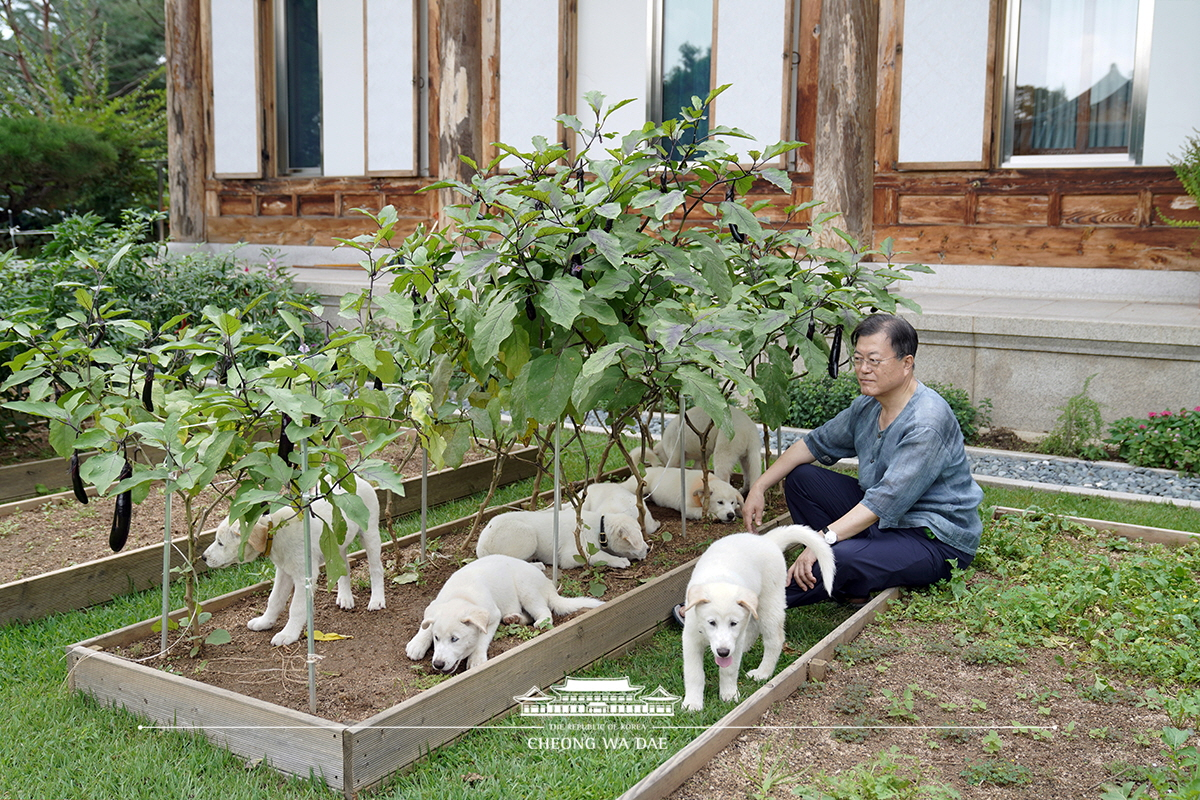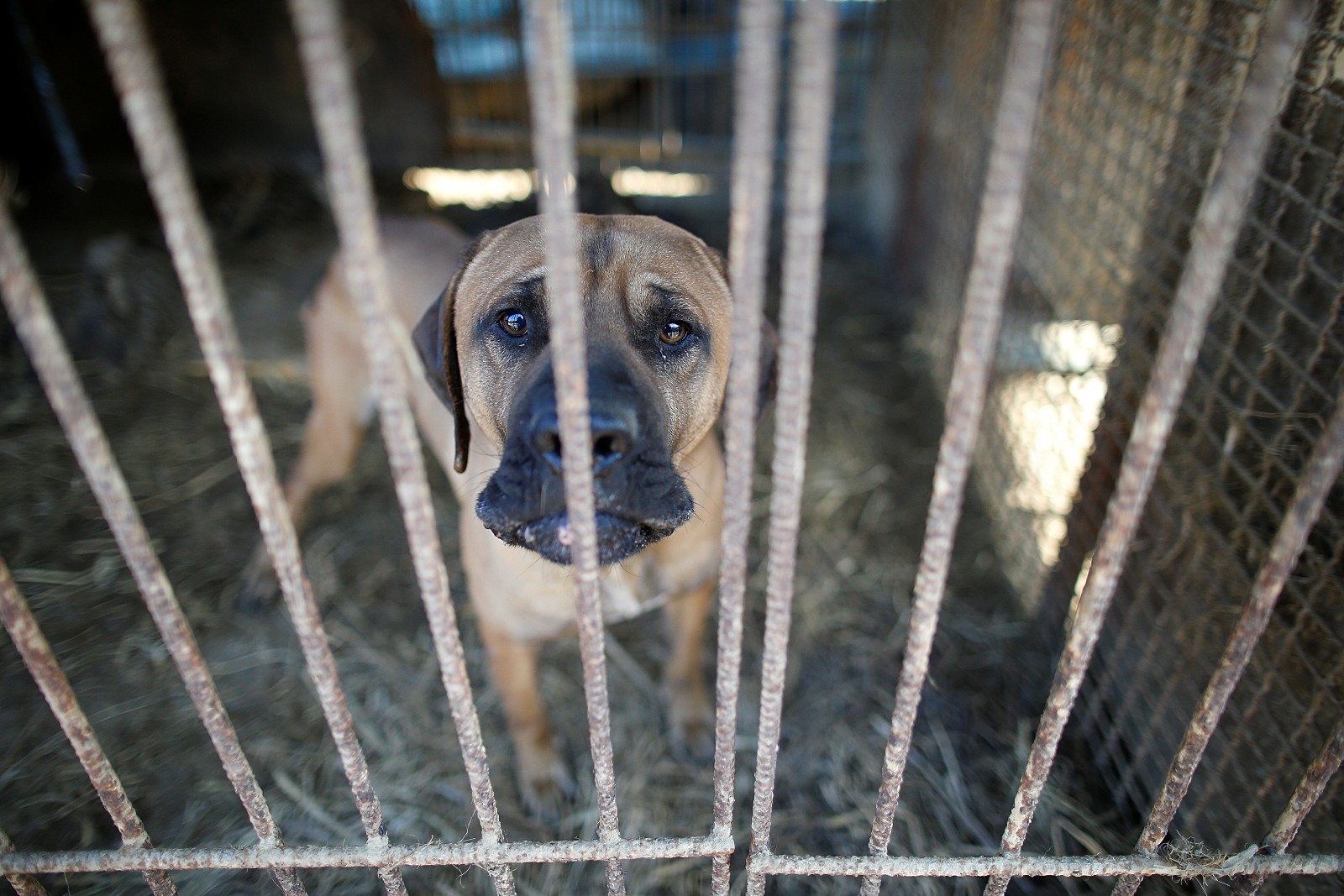On September 27, South Korea’s President, Moon Jae-in raised the need for the government to consider imposing a formal prohibition on dog meat consumption in a weekly meeting with his staffers at the Blue House. This was the first time that the president of South Korea directly mentioned the legal regulation of dog meat. Korean lawmakers have been working hard to ban the practice for years, as it is seen as a controversial tradition. A final law has yet to be put forward because the viewpoints of all stakeholders must be considered. According to most Koreans, the nation is not ready for an all-out ban, but they do agree legislation dealing with the ethical processing and safe handling of the meat is long overdue.
 |
| ▲ South Korea’s President Moon Jae-in is with dogs at the presidential residence, Cheongwadae. (Photo from Cheongwadae Website) |
A fierce conflict has erupted between those that support the banning of eating dog meat and those who insists that it is a part of traditional dietary culture. Animal protection groups welcomed the fact that President Moon raised the issue with his cabinet, seeing it as positive sign for their cause. Businesses that depend on breeding dogs for edible products however, complained about the discussions and preferred the government focus on the safe processing of the meat for consumption.
An increasing number of people in South Korea have an aversion to the consumption of dog meat, resulting from increased globalization and the growth of a pet-friendly domestic population. In the past, more than ten million dogs were slaughtered for consumption, but that rate has dropped by ten times the former amount. There is no official material that tracks statistical data for Korean dog breeding or dog distribution for the purposes of consumption, but according to animal protection groups, up to one million dogs are distributed as food products each year. This estimate is based on data collected from the Ministry of Environment in 2017. The data indicates the market scale and dog breeding for consumption business has seen a drastic decrease over the years. Moran and Gupo markets, both popular producers of dog meat, were on the verge of shutting down due to decreasing demands for their product.
Complaints have been raised that the slaughtering process of dogs is arbitrary by butchers, and often do not fall within industry meat processing standards. This means dogs for consumption could be slaughtered in poor abattoir conditions. There is also the problem of slaughtered dogs being distributed to restaurants without taking the necessary sanitary inspection steps. Pork, beef, and chicken production all fall under the rules cited in the ‘Livestock Industry Act’, ‘Sanitary Processing of Livestock Products Act’, and the ‘Animal Protection Law.’ However, none of the laws directly apply to the processing and consumption of dog meat. This means that the industry is an unregulated blind spot in the law. This has led to ethical problems and sanitary matters further building the case for animal rights activists.
 |
| ▲ A dog is in a cage at a dog meat farm in Wonju, South Korea. (Photo from Reuters) |
In a column written for Hankyoreh, expert Ahn Yong-geun, a professor of food and nutrition at Chungcheong National University, argued that dog meats should be included in the relevant laws for slaughter, distribution, and hygiene management, if the process cannot be prevented altogether. According to Ahn, in the past, the Livestock Processing Act (Killing Act) stipulated dogs needed to be killed in legal slaughterhouses. In August 1978, however, the Ministry of Agriculture, Fisheries said everyone can kill dogs, regardless of whether they were pets or dogs raised for consumption purposes. This is because the law listed the meat as a simply a dog rather than a dog for consumption. Currently, dogs are identified as livestock under the Livestock Industry Act, however, that alone does not mean they are fit for consumption. The Ministry of Agriculture, Food and Rural Affairs said that none of the other acts involved in meat processing can apply until the Livestock Act alters their reference to dogs to ‘dogs for the purpose of consumption’. Only then can the Sanitary Processing of Livestock Products Act and the Livestock Manure Management and Utilization Act apply. Until then, the Ministry of Agriculture, Food and Rural Affairs will not offer operational permits and support the industry in the same manner as other livestock. In fact, under the Food Sanitation Act, dog meat cannot be legally distributed, and violators can face fines. This is because meat that cannot be slaughtered safely cannot be recognized as food. However, in practice, they have not prosecuted dog meat farmers because there is no consensus across the country on how to handle the practice. In the meantime, it continues to operate unregulated.
Dog farmers are demanding the Sanitary Processing of Livestock Products Act cover dog meat to better manage the killing and hygienic distribution of the product by official slaughterhouses. Dog farmers are often blamed for distributing sick dogs, when they believe the problem stems from the slaughtering process. Animal protection organizations have opposed farmers' demands, maintaining their call for a ban on eating dog meat altogether. The ministry in charge, the Ministry of Agriculture, Food and Rural Affairs, said their hands are tied unless the Livestock Act is modified to define dog as a meat for consumption. Therefore, the regulation of dog meat processing remains unresolved.
Regulation of the dog meat industry affects the rights of dog eating consumers, sellers, and distribution dealers to enjoy what they want to eat and work in the field they want. While new legislation may limit the freedom of some consumers who enjoy eating dog meat, it may be required to suppress the health problems they have faced resulting from the unsanitary distribution and market environment. So, we should consider this agenda not only for the purposes of animal rights, but also for the benefits of public health.
With no outright ban on the practice, we cannot neglect the loose net of the law anymore. Whether you are familiar with dogs or not, it is a problem for all citizens. A balanced solution that addresses the positions of all side should be proposed after a thorough vetting of the matter and a better understanding the industry has evolved.
권유지, 김주예, 류시은 dankookherald@gmail.com

![[Campus Magnifier] Let's Surf the Library!](/news/photo/202404/12496_1765_4143.jpg) [Campus Magnifier] Let's Surf the Library!
[Campus Magnifier] Let's Surf the Library!
![[Campus Magnifier] Let's Surf the Library!](/news/thumbnail/202404/12496_1765_4143_v150.jpg)





